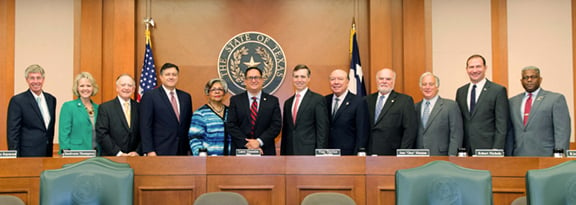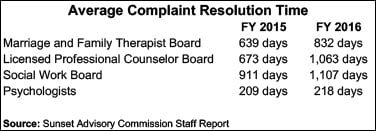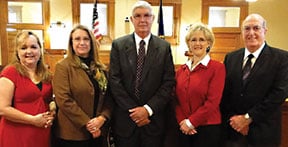Family Law Courts
Boards of Examiners Ripped for Backlogs
Boards of Examiners Ripped for Backlogs
Sunset Review rough for boards that license and regulate
professionals who play key roles in child-custody cases
by Ken Martin
© The Austin Bulldog 2016
Part 6 in a Series
Posted Friday December 16, 2016 10:39am
The Austin Bulldog’s investigation of problems in family law courts involving child-custody cases includes a review of complaints against some of the professionals appointed by courts to provide related services. Specific complaints will be detailed in later installments of this ongoing series. An overarching question is why does it take two or three years to resolve complaints against these practitioners? The answer was revealed in the biennial exercise known as Sunset in Texas, which is now underway.
Sunset in Texas is not the romantic experience the name might imply. It’s not a time for kicking back, sipping a beer, and watching the sun dip into the chilly waters of Lake Travis. Sunset in Texas is a time for a deep and probing examination of a good portion of the 130-odd Texas governmental agencies to learn how well they are performing. It’s a time for determining whether the sun should set on their work and deciding if these agencies should fade into history.
Although the Sunset process for the 2016-2017 cycle is scrutinizing 25 separate agencies, this story will focus solely on the four professions whose services are utilized to varying degrees in family law cases involving child custody: Professional Counselors, Psychologists, Social Workers, and Marriage and Family Therapists.
Practitioners in each of these professions are licensed and regulated by a separate Texas State Boards of Examiners. Each of these boards will be abolished unless lawmakers reauthorize them in the 85th Session of the Texas Legislature that convenes January 20.
As with all agencies now under review, if these four are reauthorized they could be radically reformed. They could also be moved under the umbrella of a different state agency.
Three of these Boards of Examiners—for Professional Counselors, Social Workers, and Marriage and Family Therapists, which collectively oversee some 50,000 licensees—currently receive administrative support from the Texas Department of State Health Services (DSHS).
It’s apparent these three boards will not be left to continue floundering as they have been, based on the scathing review of their performance aired during a December 8 hearing of the Sunset Advisory Commission. Under the current operating procedures and with insufficient staff support from DSHS, they have not kept up with the workload. The backlog of unresolved complaints against the professionals they regulate has grown exponentially in recent years.
 During Fiscal Years 2000 through 2006, the average length of time for these three boards to resolve complaints rarely exceeded 200 days. But since FY 2007 the length of time needed to resolve complaints has been rising steadily and now stands at 2.3 years for marriage and family therapists, 2.9 years for professional counselors, and 3 years for social workers.
During Fiscal Years 2000 through 2006, the average length of time for these three boards to resolve complaints rarely exceeded 200 days. But since FY 2007 the length of time needed to resolve complaints has been rising steadily and now stands at 2.3 years for marriage and family therapists, 2.9 years for professional counselors, and 3 years for social workers.
These delays fail to protect the health and safety of Texans—many of whom are struggling with litigation and mental stress. The delays also soil the reputation of practitioners who may have been wrongfully accused of misconduct and would like a timely opportunity to clear their names.
The Sunset Advisory Commission Staff Report recommended that the Board of Examiners of Professional Counselors, Social Workers, and Marriage and Family Therapists all be transferred to the Texas Department of Licensing and Regulation (TDLR) by August 31, 2018.
In addition the staff report recommended that the boards’ complaints and ethics committees be abolished, that board members not be involved in investigating complaints, and that TDLR develops a policy for prioritizing complaints and updates enforcement plans. In addition the report calls for throwing a wider net when checking the backgrounds for licensure applicants to include fingerprints and checks for disciplinary actions taken in other states.
Psychologist examiners board excels
A Troubled Father’s Last Chance
Custody Dispute Ends in Mistrial
Commissioners Respond to ‘Extortion’ Complaints
Commissioners Respond to ‘Extortion’ Complaints
But discuss only cost of Williamson County Domestic
Relations Office, and claim need for judges to buy in
by Ken Martin
© The Austin Bulldog 2016
Part 3 in a Series
Posted Tuesday April 26, 2016 4:03pm
 After months of hearing from parents who claim they are being ripped off by racketeering in the family courts of Williamson County, Precinct 1 Commissioner Lisa Birkman briefed the Commissioners Court about research she had done to explore the possibility of establishing a Domestic Relations Office (DRO). That is a goal advocated by the Texas Association for Children and Families (TACF).
After months of hearing from parents who claim they are being ripped off by racketeering in the family courts of Williamson County, Precinct 1 Commissioner Lisa Birkman briefed the Commissioners Court about research she had done to explore the possibility of establishing a Domestic Relations Office (DRO). That is a goal advocated by the Texas Association for Children and Families (TACF).
Birkman described the duties of the professionals who are appointed by courts to assist in making decisions about child custody. The person appointed will interview the children, parents, and others and report to the judge, she said. In Williamson and most other Texas counties the person appointed would be an attorney or other licensed professional in private practice.
She noted that the Family Code allows the Commissioners Court to establish a DRO, such as the one operated by Travis County. Among other services provided by the Travis County DRO, it has employees qualified to be appointed as guardian ad litem to advise the court on the best interests of children.
“There's only a few counties that do it that way and it's expensive,” Birkman said. (Actually there are eight such counties in Texas, per the Texas Association of Domestic Relations Offices.)
Birkman cited cost figures for three DROs:
• Harris County (Houston) has 42 employees and a $3.3 million annual budget.
• Tarrant County (Fort Worth) has 83 employees and a $7.2 million budget.
• Travis County (Austin) has 51 employees and a $3.6 million budget.
“The way we do it in Williamson County, and most counties in Texas, is the parents bear the cost,” Birkman said.
Judges not yet responsive
Parents Demand Halt to ‘Extortion’
Parents Demand Halt to ‘Extortion’
Texas Association for Children and Families and
parents demand reforms under threat of lawsuit
by Ken Martin
© The Austin Bulldog 2016
Part 2 in a Series
Posted Monday April 18, 2016 9:12pm
 Tomorrow morning the Williamson County Commissioners Court is scheduled to hear yet again from the Texas Association for Children and Families (TACF) about alleged corruption. The organization claims that for years a “racketeering enterprise” has been operating right under the noses of family law courts in Williamson County, wrecking the lives of children and parents, and ruining them financially.
Tomorrow morning the Williamson County Commissioners Court is scheduled to hear yet again from the Texas Association for Children and Families (TACF) about alleged corruption. The organization claims that for years a “racketeering enterprise” has been operating right under the noses of family law courts in Williamson County, wrecking the lives of children and parents, and ruining them financially.
The court-appointed professionals named by the TACF as being involved in the alleged scheme who were reached for comment have denied any wrongdoing.
This will be the fourth time representatives of the TACF and parents have appeared in person since last December 1 to complain about alleged injustices and plead for help. Previous appearances have yielded only disclaimers that these problems are beyond the power of the Commissioners Court to remedy.
This is a last-ditch attempt to get a so-far resistant Commissioners Court to establish a Domestic Relations Office, similar to one operated in Travis County for decades. This office would provide essential services focused solely on achieving the best outcomes for Williamson County parents going through divorce and child-custody disputes.
 Joseph Gale, TACF’s executive director, will tell commissioners that parental rights are being abused and children are being damaged by a number of professionals involved in family law cases in Williamson County, who are allegedly more interested in extracting fees than achieving the best outcomes.
Joseph Gale, TACF’s executive director, will tell commissioners that parental rights are being abused and children are being damaged by a number of professionals involved in family law cases in Williamson County, who are allegedly more interested in extracting fees than achieving the best outcomes.
TACF and these parents seek the Commissioners Court’s cooperation in initiating a remedy. If that assistance is not forthcoming by June 1, TACF says Williamson County will be named as a defendant in a lawsuit.
Gale will deliver signed letters to the Commissioners Court on behalf of TACF, four mothers, and one father. These and possibly other parents are expected to be plaintiffs if a lawsuit is necessary. The parents claim their families and their children were and are being harmed by the failure of the Commissioners Court to supervise the judges and court appointed professionals.
‘Racketeering enterprise’ alleged
A Tale of Two Counties
A Tale of Two Counties
Child custody cases get help in Travis County but in
Williamson and most other counties you're on your own
by Ken Martin
© The Austin Bulldog 2016
Part 1 in a Series
Posted March 15, 2016 1:22pm
 In the State of Texas in 2013 there were 76,423 divorces involving 59,135 children, according to statistics provided by the Texas Department of State Health Services’ Center for Health Statistics. Some of those divorces resulted in amicable arrangements for child custody in which the parents rose above self-interest and focused on sharing their responsibility to shepherd happy and well-adjusted children into adulthood.
In the State of Texas in 2013 there were 76,423 divorces involving 59,135 children, according to statistics provided by the Texas Department of State Health Services’ Center for Health Statistics. Some of those divorces resulted in amicable arrangements for child custody in which the parents rose above self-interest and focused on sharing their responsibility to shepherd happy and well-adjusted children into adulthood.
But there is all too much evidence of divorce cases in which the bitterness bestowed by bickering parents pervades every aspect of their children’s lives. In those cases, money may be the least of concerns in the combat for control and custody of children borne out of love and delivered into the war zone of a contentious divorce.
Divorces are emotionally exhausting and can leave parting parents drained, both emotionally and financially. When minor children are involved, the romance may have ended but the parents remain connected to jointly look after their custody, housing, education, medical care, and emotional well-being until they come of age.
Even long after the divorce is final, the ties that bind divorced parents together over issues of child custody may fray and grow contentious.
Divorced parents may continue to struggle for control over critical issues: Where will the children live? Where they will be educated? In which extracurricular activities will they participate? What kind of medical care will they will receive? Not the least of these stressful issues is which parent will pay for these and the myriad other expenses involved in raising children?
When one parent’s behavior appears to threaten or endanger the children—or for whatever reason becomes unacceptable to the other parent—the deadlocked former mates may jump to hire lawyers and seek to air their grievances in a court of law.
The children’s welfare—the thing that should be uppermost in the minds of deadlocked parents—may get shoved aside, become a casualty of family warfare. At that point the overriding goal of looking out for the children becomes a concern for the court. The judge may choose to appoint someone to look after the best interests of the children.
Whoever’s appointed has to come in and objectively examine the circumstances and then make an informed recommendation to the court about what’s best for the children. That person is usually an attorney ad litem or a guardian ad litem. Translated from the original Latin, ad litem means “for the lawsuit.”
The key difference between the two types of ad litems is explained in an informative guide for parents published online, along with a lot of other information important to divorcing couples, by the Travis County Domestic Relations Office:
The Guardian Ad Litem, who is often a licensed professional counselor, focuses on the child's best interests in making recommendations to the court, even if that is not what the child says he or she wants (emphasis added).
An Attorney Ad Litem is appointed by the court to represent the child's best interests and wishes. However, if the child's best interests are different from the child's wishes, the Attorney Ad Litem will represent the child's wishes (emphasis added).
Typically a given custody case would involve one or the other of these kinds of ad litems and not both.
Once appointed, the ad litem will investigate, complete written reports for the court, and testify in court hearings.







